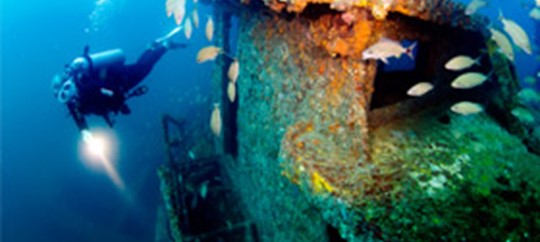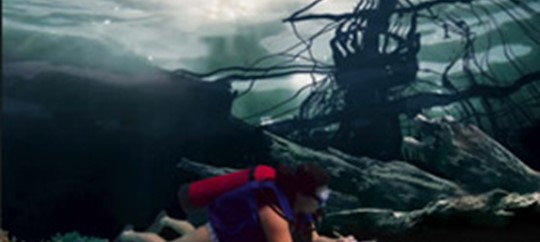Underwater
What is Underwater Archaeology?
Underwater, marine, maritime, or nautical archaeology is simply archaeology done under the water. Shipwrecks are the most common type of site studied, but harbor and dock remains, fishing structures, and flooded land sites also may be investigated. Where terrestrial (land) archaeologists use trucks to get to their sites, underwater archaeologists use scuba gear. Together with cultural and physical anthropology and linguistics, archaeology - both on land and underwater - is a subfield of the science of anthropology, the study of humankind. Basically, the tools, techniques, and products are the same no matter where one works, although different environments may require adaptations to the task at hand. But the goals are the same: understanding our past.
Thanks to the longest coastline in the continental United States and hundreds of lakes, springs, and rivers, Florida has many wet sites and opportunities to study the past under water.
Why is Underwater Archaeology Important?
Archaeology is the closest thing we have to a time machine. It is the only way we can know the unrecorded, and sometimes even the recorded, past. History may be written by the victorious, but archaeology is about the common people. Florida has archaeological sites ranging in age from thousands-of-years-old prehistoric habitations, to colonial Spanish shipwrecks, to World War II military bases. Most people, however, think of shipwrecks when they think of underwater archaeology.
Shipwrecks are the records of "moments in time" and often contain much information about people and life onboard. Shipwrecks, however, are non-renewable resources. They are time capsules of history and once they are disturbed or destroyed they are gone forever. Even the careful scientific methods of archaeology are controlled destruction. Coral reefs and manatees will grow back (although without our protection and concern, we may lose them before they have a chance to regenerate). Shipwrecks will never grow back. New wrecks may be made, but there will never be another wrecked Spanish galleon or sunken Civil War gunboat. The study of these "microcosms" of history is vital to our understanding of the people who used Florida's waters before us. But why should we even try to understand the past? The 19th-century Spanish philosopher Santayana said it best when he said, "Those who refuse to learn from the mistakes of history are doomed to repeat them."
The goal of Florida's Bureau of Archaeological Research is the preservation of Florida's cultural resources for the benefit of ourselves and coming generations. All of us who spend time under water know that it is a fragile and changing environment. We share not only a fascination for the underwater world, but also common concerns and responsibilities for its welfare in the future. As we learn more about its hidden secrets, we begin to understand how easily they can be lost forever.
Who Manages Florida's Underwater Archaeological Sites?
Florida's Department of State, Office of Cultural, Historical and Information Programs includes the Bureau of Archaeological Research which employs a State Underwater Archaeologist and several assistants. Personnel from this office routinely work with the public, the sport diving community, universities, colleges, and museums to examine and interpret underwater sites. Working with groups of volunteer divers, they have conducted surveys and excavations on both prehistoric and historic sites located offshore and in rivers and sinkholes - from submerged Native American middens (garbage dumps) and habitation sites to the remains of sunken steamboats and schooners. Since Florida has one of the longest continuous coastlines in the country, not to mention its river and cavern systems, the range of underwater archaeological sites is broad and covers thousands of years. Since the advent of scuba diving in the 1950s, many sites have been discovered by sport divers and amateur archaeologists; but there are hundreds more about which we know very little.
The State Underwater Archaeologist and the Underwater Archaeology Team are employed to help you protect and learn more about Florida's underwater cultural resources. Staff are always available to answer questions, send out informational packets, and tell you how you can become more involved in helping them record and research your State's history. Please contact them at the following address:
| Bureau of Archaeological Research B. Calvin Jones Center for Archaeology 1001 de Soto Park Drive Tallahassee, Florida 32301 Phone: 850.245.6444 Fax: 850.245.6452 |



